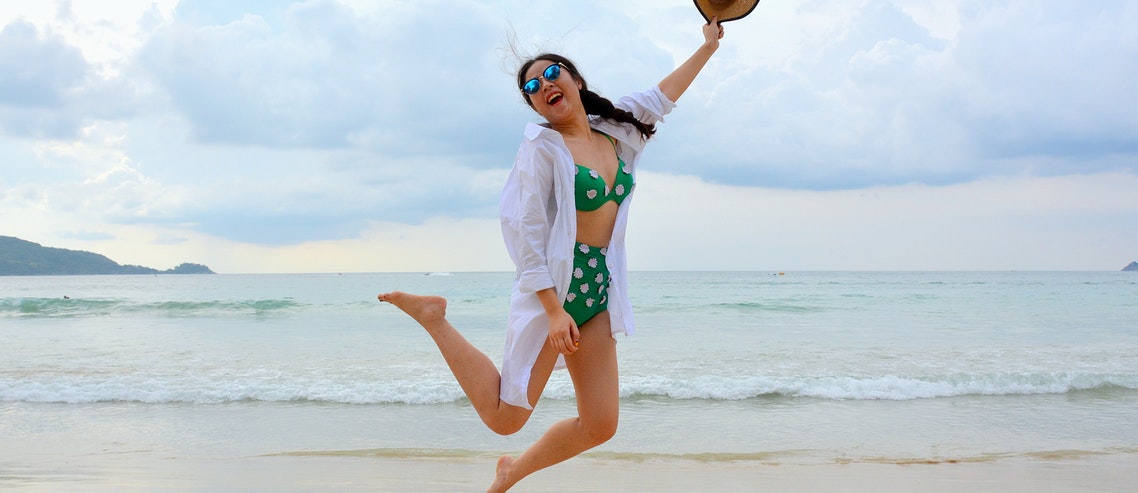Staying Healthy During the Summer Heat in Thailand
Staying healthy during the summer in Thailand could be a huge nuisance as there is potential for the temperature to rise and increase the risk of heat-related illnesses. Among those illnesses are dehydration and sunburn, which all culminates in heatstroke.
In today’s blog post by Pacific Prime Thailand, we will be going over the notable heat-related illnesses and how to stay healthy amidst the heat during the summer in Thailand.
Avoiding Heat-Related Illnesses
From dehydration and sunburn to the pinnacle of heat-related illnesses, heatstroke, staying healthy during the summer and avoiding these illnesses can be as simple as drinking plenty of water, finding proper shelter, or making clothing adjustments.
Below are the notable heat-related illnesses and how to avoid them.
Dehydration
One of the most common heat-related illnesses, dehydration is when the human body loses more fluids than it consumes, which makes normal body operation problematic. One major cause of dehydration during the heat is excessive sweating.
Some of the key symptoms of dehydration include dizziness, dry mouths, increased thirst, fatigue, and dark-colored and decreased urination.
Prevention:
- Drink plenty of water throughout the day, a minimum of six to eight cups.
- Refrain from drinking coffee and alcoholic beverages, as those are linked to dehydration.
- Consume water-rich fruits and vegetables such as cucumbers, tomatoes, watermelons, or strawberries.
Sunburn
Sunburn refers to skin damage from ultraviolet (UV) ray exposure, characterized by the skin taking on a burnt reddish hue followed by pain, swelling, and possibly sunburn blisters. Other symptoms are similar to those of the flu, such as fevers, chills, nausea, headaches, or malaise and fatigue.
If left unprotected, sunburn can also lead to skin aging, skin cancer, or even DNA damage.
Prevention
- Always wear sunscreen evenly throughout your body.
- Reapply sunscreen every two to three hours, as well as after each time you swim.
- Wear long-sleeved shirts and pants (or arm sleeves and leggings).
- Seek shelter.
- Wear wide-brimmed hats and UV protection-filtered sunglasses.
Food Poisoning
Food poisoning is a huge issue in Thailand due to the popularity of street food and the abundance of fresh fruits and vegetables. During the summer in particular, the heat allows bacteria to thrive and increases the risk of food contamination.
The symptoms of food poisoning include diarrhea, stomachaches, nausea, vomiting, and fevers.
Prevention:
- Consume freshly-cooked meals, particularly meat or fish, as this will help lower the risk of consuming salmonella-contaminated food.
- Store meat and fish in separate bags from your other groceries to prevent cross-contamination.
- Wash or peel all fruits and vegetables before consumption.
- Refrigerate your groceries if that’s how they are meant to be stored.
- Refrain from consuming pre-made food from street food stands if they are prone to contamination from air pollution or the vendor’s improper hygiene.
Heat Exhaustion and Heatstroke
Heat exhaustion and heatstroke arise as a result of body overheating. While heat exhaustion usually goes away on its own as you cool down, it can lead to heatstroke, and you will need to treat it as a medical emergency.
Heatstroke is when the body temperature rises beyond 40 degrees Celsius and can be fatal if left untreated. Thus, it’s crucial to know the exact symptoms and treatment methods, as it will not only save you but also anyone else who may have heatstroke.
Heat Exhaustion Symptoms
- Body temperature reaching 38 degrees Celsius or above.
- Dizziness and confusion.
- Excessive sweating along with pale, clammy skin.
- Rapid breathing and pulse.
- Intense thirst.
Heatstroke Symptoms
- Body temperature reaching 40 degrees Celsius or above.
- Flushed, clammy skin.
- Lack of sweat.
- Unconsciousness.
- Rapidity or shortness of breath.
- Headaches.
- Vomiting.
Treatment:
- Give the person plenty of water to drink.
- Move the person to a cool, sheltered area.
- Lay the person down and raise their feet slightly.
- Remove excessive, weighted clothing such as jackets or socks.
- Apply cold packs or wet their clothes and skin, and then fan them.
If you see anybody exhibiting signs of heat exhaustion, immediately call the 1669 emergency hotline to request ambulance pickup. While waiting, make sure to cool them down using the treatment methods mentioned above.
Staying Healthy During the Summer Heat
The best way to stay healthy during the summer heat is to prevent heat-related illnesses, particularly in babies, young children, and older individuals, as they are more susceptible to heat-related illnesses and can suffer more or develop symptoms faster than adults in their prime.
Below are ways to stay healthy amidst the heat.
Drink Plenty of Water and Be Mindful of What You Eat
The first way to stay healthy during the heat is to stay hydrated. Contrary to popular misconceptions, thirst is not always the best indicator of dehydration. In fact, urine color is a more accurate representation of hydration. For instance, the darker the color of our urine, the more dehydrated we are.
Thus, it’s essential to make a habit of drinking plenty of water in the summer and beyond, as our bodies sweat more in heat and subsequently lose more fluids. Also, as they cause dehydration, refrain from drinking coffee and alcoholic beverages.
Try not to consume heavy meals with carbohydrates and proteins, as they take more time and energy to digest, thus requiring more body heat.
If possible, you can try consuming spicy food, as the sweating will cool off the body. If not, you can consume cooled snacks and drinks such as ice cream, smoothies, and other cooled drinks.
Wear Cool Clothes
Lighter colors, such as white, cream, yellow, or light blue can help reflect sunlight and heat. Meanwhile, darker colors such as black or midnight blue attract and retain heat. Additionally, materials such as cotton and linen are much more breathable, as they absorb sweat and encourage ventilation.
Make sure you also have looser clothes as they help with ventilation and do not affect circulation in your body like tighter clothes.
Find Shelter
During the hottest time of the day (11am-3pm), try to stay in the shade or air-conditioned areas, get cold showers throughout the day, and close the window shutters to prevent your area from overheating. It’s also a good idea to wear hats and sunglasses to further protect your skin and eyes.
Exercise Caution When Exercising or Working Outside
It’s not advisable to work or exercise outside when it’s the hottest part of the day. If unavoidable, however, make sure to drink plenty of water, wear a hat, and take as many breaks in the shade as you need. Make sure not to overexert yourself and seek cooler shelter if you feel unwell.
Conclusion
In conclusion, it’s crucial to stay safe during the summer heat as what may begin as dehydration can eventually lead to more serious cases such as heat exhaustion and heatstroke. All this can be prevented just by staying hydrated, finding shelter, or making dietary and clothing adjustments.
As a leading international health insurance broker, Pacific Prime Thailand has experience matching both expats and local Thai citizens to their health insurance plan of choice. Whether you’re an expat in Thailand or a local citizen yourself, our team of experts is more than happy to help you.
If you have any further questions, please get in touch with us.
- PrEP in Thailand: Cost and Where to Buy It - March 17, 2025
- New Cash-On Delivery Law Allows Buyers to Inspect Packages - October 9, 2024
- Are You at Risk of Parkinson’s Disease? - October 7, 2024





Comments
Comments for this post are closed.
We'll notify you
when our team replies!